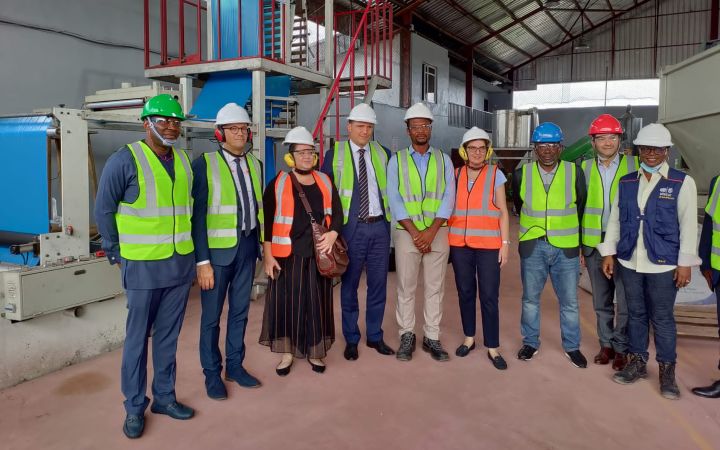21 October 2022, Geneva, Switzerland - Environmental sustainability is key to the United Nations 2030 Agenda for Sustainable Development. As we draw closer to 2030, it is critical that the international community continues to prioritize creating a sustainable future. Empowering local communities in their efforts to work towards environmental sustainability remains a key objective of UNITAR, and in addition to benefiting the environment, can uplift and empower the local communities involved, especially girls and women.
Pollution reduction is an essential step needed to achieve the Sustainable Development Goals outlined in Agenda2030. To aid in this regard, UNITAR’s Division for People and Social Inclusion has partnered with Nigerian National Petroleum Corporation (NNPC) and Total Energies Nigeria to create a recycling plant in Port Harcourt, Nigeria, empowering members of the Elelenwo community in the process.
The recycling plant, inaugurated in February 2022, has been vital in reducing the amount of plastic being disposed of in the local rivers, canals, and other areas within the community. This pollution has a direct negative impact on surrounding nature and on the health of those who encounter it. Pollution reduction has an overarching impact on the health of the earth and its inhabitants and by extension, sustainable development. The recycling plant has played a vital role in the few months since its inauguration, by significantly improving the situation on the ground. Since February 2022, the recycling plant has successfully removed approximately 104 tons of plastic waste from the environment and has repurposed over 60 tons into plastic pellets for industrial use. The ability of the plant to repurpose objects which do harm unto the local environment into pellets for industrial use contributes to various horizontal and vertical chains of production and ensures the vitality and longevity of the plant.
In his remarks at the commissioning of the plant, the Managing Director of Total Energies, Mr. Mike Sangster, said “Our objective is to develop a sustainable model where local entrepreneurs will be empowered, trained, and supported to run the business, thereby supporting local enterprise while promoting sustainable waste management in line with the United Nations’ Sustainable Development Goal (SDGs) 12, which calls for sustainable consumption and production patterns”.
Beyond directly impacting the local environment, the plant has worked to empower the thirty employees and trainees involved in its everyday process. Project managers ensure a safe and stable work environment and are committed to gender equality practices in hiring and investing in employees by providing opportunities for skill acquisition.
As the project progresses, it has gained significant recognition from international dignitaries. French Ambassador to Nigeria, H.E Mrs Emmanuelle Blatmann, who visited and toured the recycling plant with senior management staff from TotalEnergies, project managers from the plant, and a UNITAR Representative, recognized the success of the project. H.E Mrs Blatmann acknowledged the Project's achievements and congratulated both partners for their contributions to mitigating plastic waste pollution and skills acquisition in the Niger Delta.
The goal of the collaboration and between UNITAR and Total Energies Nigeria is to influence research and generate opportunities to small and medium size businesses in Nigeria that Nigerians themselves fully run.
UNITAR aspires to collaborate with Total Energies Nigeria and other companies to spur international organizations' drive to enlarge their collaborative, sustainable environmental efforts within continental Africa.


